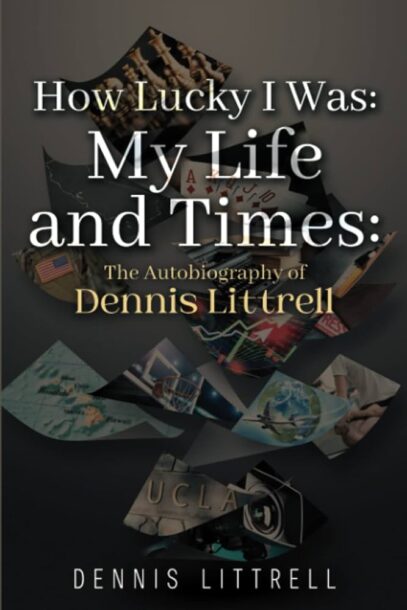 By DENNIS LITTRELL (2023)
By DENNIS LITTRELL (2023)
Dennis Littrell is a writer, teacher (who counted yours-truly among his pupils), book/movie reviewer and professional poker player. HOW LUCKY I WAS is his self-published autobiography, which first saw print in 2017 as IF I HAD BEEN A BETTER MAN.
How the average reader, i.e. one who didn’t live in Southern California in the 1990s and come into direct contact with Mr. Littrell, might react to this book I’m not sure, but speaking as one who did reside in So Cal and cross paths with the author, I found it an enjoyable read. I also appreciated the fact that Littrell’s major attribute as a writer—honesty—is on full display, with his recollections rendered in a laudable no-fucks-left-to-give manner.
Following an introduction in which Littrell unhesitatingly nominates himself for the Nobel Prize, he takes us through his rough-and-tumble 1950s childhood, much of it spent in an Azusa, CA halfway house for boys. He served in the army and was stationed in France, and then attended UCLA, followed by brief stints as a newspaper reporter and novelist (with the 1973 publication A PERFECTLY NATURAL ACT), with his major source of income being his winnings at poker tournaments.
In the late eighties Littrell decided to become a teacher, and found employment at Mira Costa High School in Manhattan Beach, CA. This posting, however, landed him in a hotbed of racism, sexism and snobbery (all of which this Manhattan Beach native can affirm), a situation rendered even more unpleasant by the 1994 death of his second wife from cancer, which is described in downright excruciating detail. He also had a relationship with his grown daughter, whose “sense of entitlement was out of step with her station in life and her modest accomplishments” (one of the nicer things he says about her), that was increasingly frosty. It took until the early aughts for Littrell to regain his equilibrium, via a most unexpected source: he became a top-rated reviewer on Amazon and got together with a fellow reviewer named Amy.
This book’s initial version ended at this point (and the sentence “Sometime later Amy fell asleep in my arms”). The updated text continues for another hundred or so pages, whose tenor is indicated by chapter headings like “Amy and I Break Up,” “Physical and Mental Decline,” “Feeling Worthless,” “Blood All Over the Floors” and “I Become an Alcoholic, But So What?”
My favorite parts were the descriptions of life at Mira Costa. Littrell is quite frank about his clashes with the “old guard” teachers who zealously upheld the corrupt status quo, and also his interactions with students (whose ranks include a number of names I recognized, including Bill Loudon, Chris Lee, Heather Kane, Travis Fargher and “Adam G.,” apparently “a brilliant writer, probably the top creative writer on campus,” but who “writes totally outrageous stuff, death and gore and violent sex, whenever he can work it in”).
Littrell also admits to taking an outsized interest in his girl students, and having considered Crossing the Line: “it is very easy to fool oneself into believing that making love to the girl is the right thing to do. I know. I’ve been to that precipice.” That unfortunate tendency lingered even after he quit teaching in the mid-nineties, with his over-attentiveness to a former student resulting in a joint restraining order—an event dramatized in Littrell’s self-published HIGH SCHOOL FROM HELL, a novel that didn’t impress me overall but deserves points for its candor.
The same is true of HOW LUCKY I WAS, which suffers from an overindulgent treatment (I say it could have done without the lengthy poker stats and lists of favorite authors, directors, etc. that Littrell insists on including) and a lack of editorial vetting. Yet its unblinking, excuse-free approach gives it a definite edge; this might not be the book we California bred Mira Costa grads want, but it is very likely the one we need.
